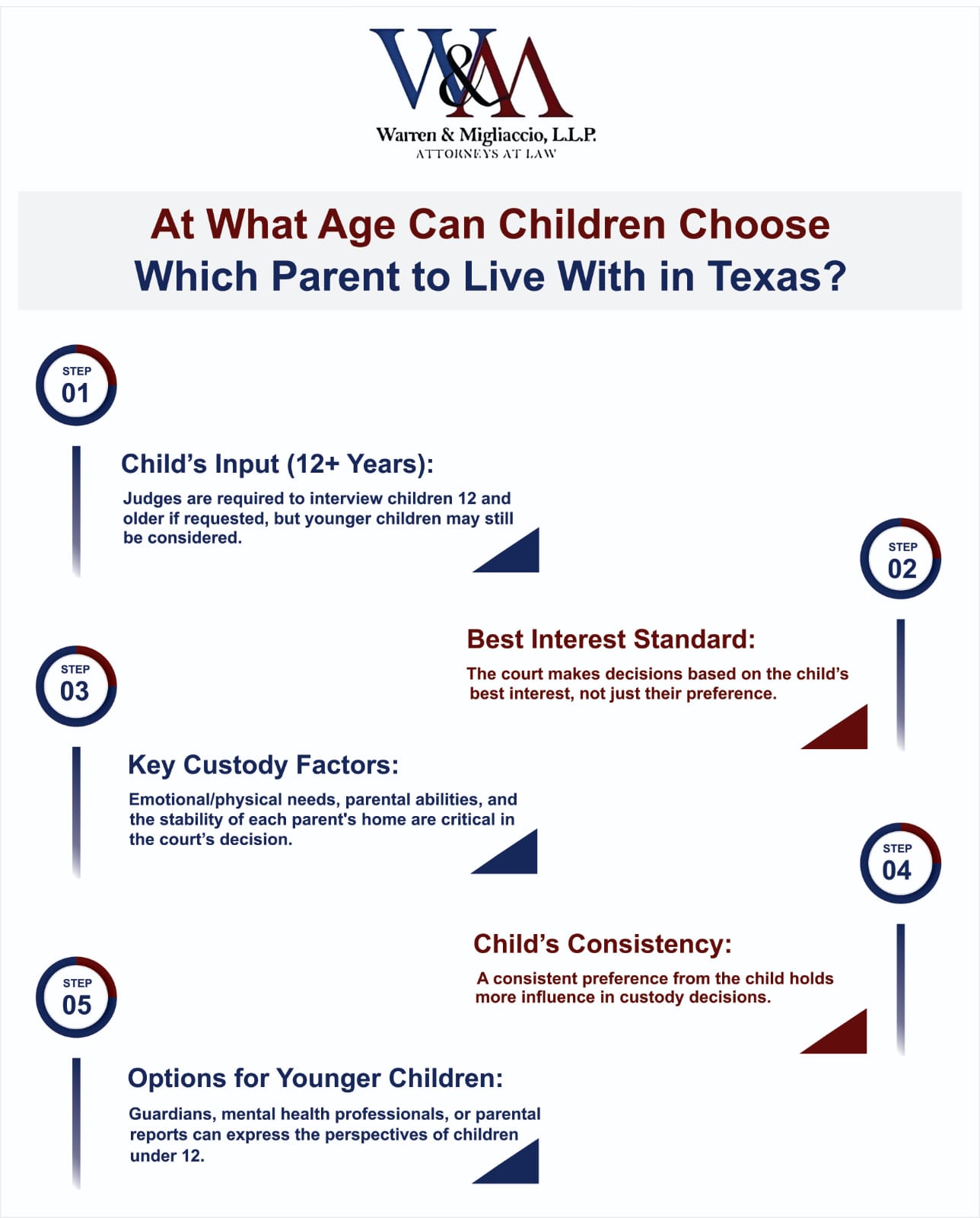When a Texas divorce involves minor children, child custody arrangements become a paramount concern. Determining the primary residence of the child, often referred to as conservatorship, is a crucial element of the divorce settlement. While parents ideally reach an amicable agreement, in contested cases, the court ultimately decides where the child will live. This raises the question: at what age, if any, can a child in Texas influence the court’s decision on their living arrangements?
This blog post, authored by Christopher Migliaccio, Founding Partner at Warren & Migliaccio, L.L.P. in Richardson, Texas, delves into the intricacies of child custody decisions in Texas, specifically focusing on a child’s ability to express their preference. We will explore the relevant Texas Family Code sections, the factors a judge considers when determining conservatorship, and the role a child’s age plays in the process. For individuals facing a similar situation, this comprehensive guide aims to provide clarity and empower informed decision-making.
Understanding Texas Family Code and Conservatorship
Texas Family Code Title 4 establishes the legal framework for child custody arrangements in the state. Section 153.001 defines “conservatorship” as the legal right to a child’s care, control, and management. There are two primary types of conservatorship:
- Managing Conservatorship: This grants the parent the right to make significant decisions regarding the child’s education, healthcare, and religious upbringing. (Texas Family Code § 153.003 (source)
- Possessory Conservatorship: This determines the child’s primary residence and the amount of visitation time awarded to the other parent. (source)
In contested custody cases, the court determines the type and allocation of conservatorship based on the “best interests of the child” standard. This necessitates a thorough examination of various factors outlined in Section 153. factors affecting the child’s welfare include:
- The child’s emotional and physical needs
- The child’s age and maturity level
- The emotional and physical capabilities of each parent
- The child’s relationship with each parent and siblings
- The stability of each parent’s home environment
- The distance between the parents’ residences

When it comes to child custody in Texas, understanding when children can express their preferences is crucial. This infographic outlines the age at which children can influence custody decisions and highlights the factors courts consider to ensure the child’s best interests are prioritized.
A Child’s Age and Influence on Custody Decisions
While the “best interests of the child” remains the paramount concern, Texas law does acknowledge a child’s developing autonomy as they mature. Section 153.009 of the Texas Family Code addresses a child’s ability to express their preference regarding conservatorship:
(a) The court may interview the child in chambers to determine the child’s wishes regarding conservatorship or visitation. The interview must be conducted in a manner that is considerate of the child’s age and maturity. (b) If the child is 12 years of age or older, the court shall interview the child in chambers at the request of a party or the motion of the court. (Texas Family Code § 153.009 (source)
Key Points to Consider:
- Age Threshold: Children under 12 years old may not be automatically interviewed by the judge. However, the judge retains the discretion to interview a younger child if deemed necessary.
- Right to Request: Either parent or the court itself can request an in-chambers interview with a child who is 12 years of age or older.
- Consideration, Not Determination: The child’s stated preference is just one factor among many that the judge weighs when deciding conservatorship. A child’s wishes are not automatically binding on the court.
- Maturity Assessment: The interview serves as an opportunity for the judge to gauge the child’s maturity level and capacity for sound judgment. This assessment aids the judge in interpreting the child’s expressed wishes.
Additional Considerations:
- Manipulation: The judge will be cautious of situations where a child may be pressured or influenced by one parent to express a particular preference.
- Emotional State: The child’s emotional well-being during the interview is paramount. The judge will ensure a safe and supportive environment to elicit genuine responses from the child.
- Attorney Representation: It is highly advisable for both parents to have legal representation during a child custody dispute. An attorney can guide you through the process, advocate for your parental rights, and ensure the court upholds the “best interests of the child” standard.
Beyond Age: Factors Influencing a Child’s Voice
While the age of 12 serves as a threshold for mandatory interviews, a child’s maturity level ultimately determines the weight given to their wishes. Here are some factors that influence a judge’s assessment of a child’s voice in custody decisions:
- Capacity for Reasoning: Can the child articulate their reasons for preferring one parent over the other? Do they demonstrate a logical understanding of the situation?
- Emotional Stability: The child’s emotional state is crucial. Is their preference influenced by fear, anger, or manipulation? Is their expressed desire a thoughtful reflection of their needs?
- Consistency of Preference: Has the child consistently expressed the same preference, or has it fluctuated? Consistency suggests a deeper conviction on the child’s part.
What if My Child is Under 12?
Even if your child is under the age of 12, there are still ways their voice can be heard in the custody proceedings. Here are some potential avenues:
- Guardian Ad Litem: The court may appoint a Guardian Ad Litem (GAL) to investigate and represent the child’s best interests. The GAL may interview the child and report their findings to the court.
- Mental Health Professional: In certain cases, the court may order a child custody evaluation by a mental health professional. This evaluation may include interviews with the child, parents, and other relevant parties. The professional’s assessment can shed light on the child’s emotional state and potential preferences.
- Parental Reports: Each parent can submit a report detailing the child’s relationship with them, including the child’s expressed wishes (if any). While not a substitute for a direct interview, these reports can provide the judge with additional context.
Effective Communication with Your Child
Throughout the custody proceedings, it is crucial to maintain open communication with your child, fostering an environment where they feel safe to express their feelings. Here are some tips for navigating this sensitive conversation:
- Age-Appropriate Language: Tailor your conversations to your child’s maturity level. Avoid burdening them with adult details or negativity.
- Focus on Feelings: Encourage your child to share their emotional experience – are they scared, anxious, or hopeful? Understanding their emotions helps determine their needs.
- Avoid Coercion or Pressure: Never pressure your child to express a preference they don’t genuinely hold. Focus on open communication and listening without judgment.
Now, let’s dive into a great article about the preference of which parent to reside with.
Can a Child Pick Which Parent to Live with in Texas?
When a divorcing couple has children, matters become more complicated. Children may have a preference on which parent they would like to live with, but they ultimately may not realize what is best for them.
The court takes into account the needs of each child by looking at their specific situation. If you are in the midst of a custody battle, you need the child custody attorneys at Warren and Migliaccio to help you retain access to your child.
Does the Age of a Child Matter in a Custody Case?
According to Texas Family Code §153.009, if either a party to the suit, an amicus attorney (an attorney appointed by the court) or an attorney ad litem (court-appointed attorney who represents a child) requests a judge to conduct an interview with a child, the judge must meet with the child if they are 12 years old or older. If the child is under the age of 12, the judge is not required to meet with them. The private meeting is usually transcribed by a court reporter.
During the private interview, the judge will hear the child’s wishes on which parent they would like to reside with, including the child’s thoughts on visitation. However, the interview is only one piece of evidence in the judge’s final custody ruling.
Even a child that is 12 years old may desire to live with a particular parent because they consider them to be more fun. The child may not necessarily be picking a parent that will suit their best interests. This is why a judge always makes the ultimate decision on the child’s primary residence, allowing that parent to have primary custody.
The “Best Interest” of the Child Standard
In Texas custody cases, judges must consider the “best interest” of the child in determining custody arrangements.
A list of factors is considered standard in helping judges determine what is best for each child. These standards were developed based on a case called Holley v. Adams, 544 S.W. 2d 367 (Tex. 1976).
In Holley v. Adams, the father, David, was granted custody of his son. His wife, Nanci, was named managing conservator, but the court did not order her to pay any child support. David was afraid that if he died that his wife would be unfit to raise their son, so David sued her in the hopes of terminating her parental rights.
Based on this case, the court developed “Holley” factors to determine the needs of a child in custody cases. These include:
- The child’s desires;
- The emotional and physical needs of the child now and in the future;
- Any emotional and physical danger to the child now and in the future;
- The parental abilities of the individuals seeking custody;
- The programs available to assist the parents;
- The plan for the child by these individuals;
- The stability of both parties’ homes and any acts or omissions of a parent which may indicate that the exciting parent-child relationship is not a proper one;
- Any excuse for the acts or omissions of a parent.
The court did state that this list does not include every factor that they review. The list is a basic framework that courts use to guide them in custody decisions.
When Can a Child Choose Which Parent They Want to Live With?
Only when a child reaches the age of 18 do they have the power to decide which parent they want to live with. Minors are not allowed to choose their primary residence or parent visitation rights.
Once a child reaches 18, they can refuse to see a parent. Prior to this age, a court will decide what they believe is best for the child.
Can a Child Custody Order Be Altered?
Yes, the custody order that is issued by the judge can be altered. However, either party is only allowed to request a change after one year has passed.
In Texas, custody arrangements are more commonly referred to as a parenting plan. If both parents agree to a different parenting plan schedule, then it is not necessary to follow the court order. However, if either party cannot agree on the visitation modification or if they want the court order to reflect their changes, then they will need to file a petition to modify the original court order. Once both parties can agree to the modification, then the only step left is to receive the judge’s approval. (source)
In Texas, there is no single age at which a child’s preference becomes a determining factor in child custody decisions. The court prioritizes the child’s best interests, and a child’s wishes may be considered along with other factors outlined in the Texas Family Code.
If you are facing a child custody dispute, it is crucial to consult with an experienced family law attorney to protect your rights and ensure your child’s well-being. The attorneys at Warren & Migliaccio, L.L.P. are dedicated to guiding clients through the complexities of Texas child custody law. We understand the emotional challenges that arise during custody disputes and will work diligently to achieve a favorable outcome for your family.
The experienced family law attorneys at Warren & Migliaccio, L.L.P. are here to guide you through the Texas divorce process with compassion and understanding. We can help you. Schedule a free consultation today by calling (888) 584-9614. You don’t have to navigate this alone.

